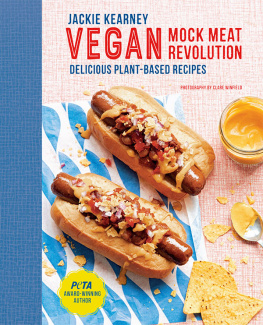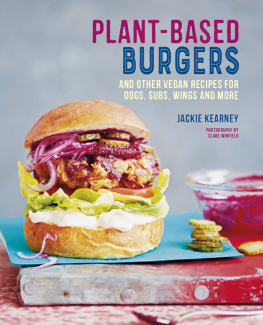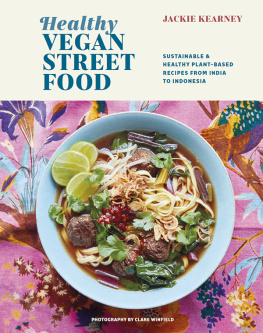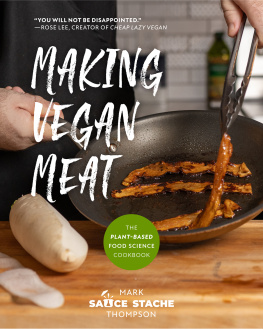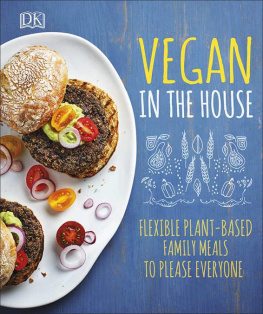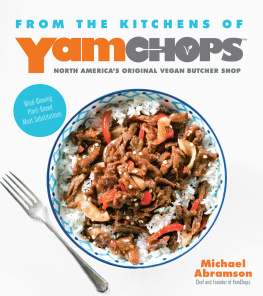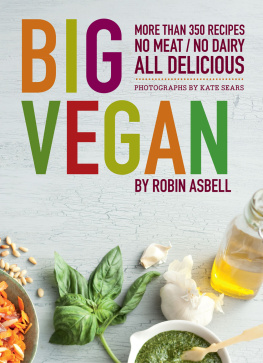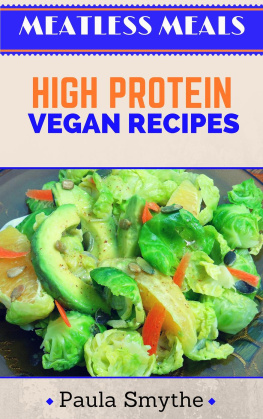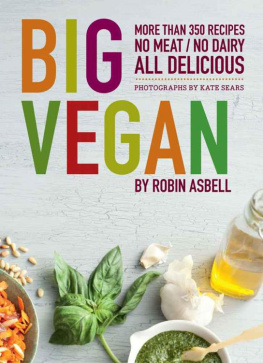VEGAN
MOCK MEAT REVOLUTION

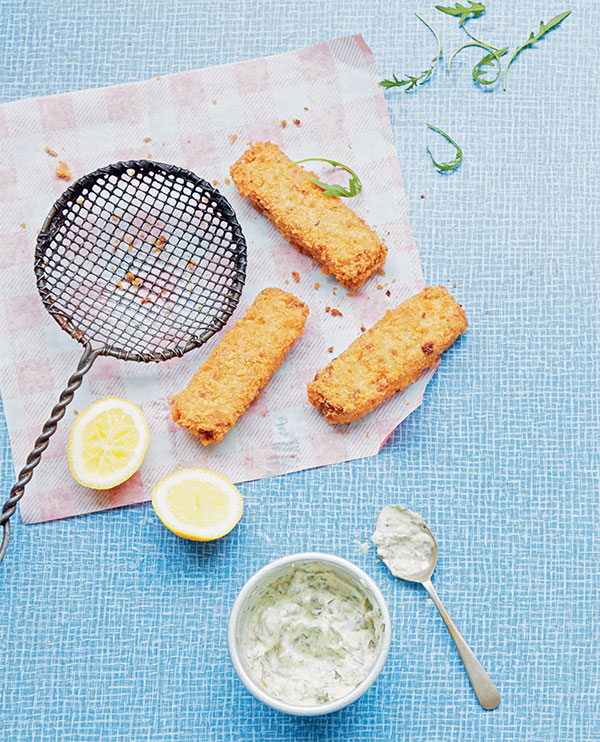
JACKIE KEARNEY
VEGAN
MOCK MEAT
REVOLUTION
DELICIOUS PLANT-BASED RECIPES
PHOTOGRAPHY BY CLARE WINFIELD

Dedication
To all the change makers.
Senior Designer Megan Smith
Design Assistance Emily Breen
Editor Miriam Catley
Production Manager Gordana Simakovic
Art Director Leslie Harrington
Editorial Director Julia Charles
Publisher Cindy Richards
Food Stylists Emily Kydd & Jackie Kearney
Props Stylists Tony Hutchinson & Alexander Breeze
Indexer Vanessa Bird
Published in 2018 by Ryland Peters & Small
2021 Jockeys Fields London WC1R 4BW and 341 East 116th Street New York, NY 10029
www.rylandpeters.com
10 9 8 7 6 5 4 3 2 1
Text Jackie Kearney 2018
Design and photographs Ryland Peters & Small 2018 The authors moral rights have been asserted. All rights reserved. No part of this publication may be reproduced, stored in a retrieval system or transmitted in any form or by any means, electronic, mechanical, photocopying or otherwise, without the prior permission of the publisher.
ISBN 978-1-78879-026-0
A CIP record for this book is available from the Brisih Library. US Library of Congress CIP data has been applied for.
Printed in China
Notes
Both British (Metric) and American (Imperial plus US cups) measurements are included in these recipes for your convenience, however it is important to work with one set of measurements and not alternate between the two within a recipe.
All spoon measurements are level unless otherwise specified.
Ovens should be preheated to the specified temperatures. We recommend using an oven thermometer. If using a fan-assisted oven, adjust temperatures according to the manufacturers instructions.
When a recipe calls for the grated zest of citrus fruit, buy unwaxed fruit and wash well before using. If you can only find treated fruit, scrub well in warm soapy water before using.
CONTENTS
Its time for a difficult discussion. Im going to talk about meat in a vegan book.
For more than 30 years now I have heard the response, but why on earth would you want to eat meat-like food when youre a vegetarian? Omnivores would look at me in complete disbelief and confusion; if you want it, just eat it! Even fellow veggies and vegans (more veggies than vegans as there werent so many vegans around back then) would sometimes look aghast; why would you WANT to recreate such a vile thing as flesh-like food? There appeared to be these two camps, and I fitted into neither.
As a child, I thought lamb chops with mint sauce were one of the most delicious things to eat on the planet. But as I got older, I became wholly and completely committed to not eating them simply because I didnt (and dont) want to eat sentient animals. I can understand how people may be repulsed by the idea of eating flesh, and that can lead them to become committed vegans and vegetarians. But the truth is, meat-eating doesnt repulse me. I just choose not to.
But everyones reasons for wanting to eat more plant-based food are driven by many more complex and varied reasons other than simply not wanting to, or actually not liking it, or that eating meat or dairy makes them feel unwell. This only makes up a small proportion of plant-based eaters these days. Some describe themselves as flexitarian, pescatarian and meat-reducing. There are also diets driven by food intolerances and autoimmune responses, especially in relation to dairy and gluten. Tofu-based mock meats, such as the Vietnamese vegan chicken ham and the versatile green jackfruit, make great gluten-free alternatives here. But for me, the reasons for mock meats need be no more complicated than simply drinking alcohol-free beer or wine. For whatever reasons, sometimes people simply choose not to.
Even just seven years ago, in one of the biggest moments of my cooking life, I pulled an ingredient from my own dish on MasterChef, because I believed another contestant who told me you cant serve that rubbish (a seitan-based mock duck) to John Torode, hell never forgive you. Believe me, it would have been the best vegan dish hed ever eaten. My frustration at my own lack of confidence in that moment, is one of the reasons Ive been so enamoured with my recent foodie trip across North America. The very thing Brits can be found criticizing them for, a sometimes bold and unapologetic attitude, was a wonderful thing when applied to food, especially vegan food. I wish I had been more bold and unapologetic with my food when I was on MasterChef things could have turned out very differently!
But I did take that boldness forward, and I was one of the first veggie chefs to be serving green jackfruit and fried gluten (seitan) to the UK mainstream by 2011. The latter having been a kitchen staple for me since my early 20s. Back then, it was only ever the kind that came in a can and I soon learned you had to rinse the product really well in warm water to get rid of the overpowering flavour of the brine. But never one to throw the baby (or the gluten) out with the bathwater, I worked on sauces and found this to be a really adaptable product to all kinds of recipes. I remember serving a warm duck salad at a party in 1994, and repeatedly responding to friends enquiries are you sure thats not really meat?
Plant-based proteins are vital to all of our diets, but especially those of us who do not consume meat or fish, or those who want to reduce consumption of animal-based protein. One of the great things about mock meats is the variation it provides in a more plant-based diet, for providing texture and flavour with great sources of protein. There is no doubt in my mind, plant-based alternatives will never substitute the bite of a real steak or lamb chop, or the complex flavours of seafood or bone broths unless they are grown in a lab which is a whole other ballpark of discussion. But the idea of recreating texture and flavour without the use of animal products is far from a new one.
Some of the earliest documentation of mock meat, specifically the production of tofu as a meat substitute, can be found during the Han dynasty 206 BC220 AD, which also coincides with some of the first recorded Buddhist scriptures and teachings being brought into China. Although Buddhism has experienced a sometimes violent history in China, it is also one of the main three religions and has shaped Chinese culture and the practice of zhai jie the undertaking of a vegetarian fast. Buddhists practice zhai jie as a cleansing period for both mind and body, which is said to help increase our sense of compassion for everything around us. The change within ourselves is said to begin with a change in our eating habits. This vegetarian fast is often observed on Uposatha by many meat-eaters a bit like Sabbath days in Christianity and Judaism or Ramadan in Islam, where people choose to intensify their practices and ethics. It is this wide-spread adoption of vegetarian eating, albeit on specific days, that gave rise to the proliferation of mock meat products in China.
Abstaining from eating meat for a specific period of time is also common in other countries in South East Asia, especially during the Nine Emperor Gods festival. This nine-day festival sees a proliferation of vegetarian food and is a joy to behold! My experience in Asian countries has been that products may be labelled vegetarian, but with the absence of dairy, many products are in fact vegan, it is simply that the term is far less widespread.

